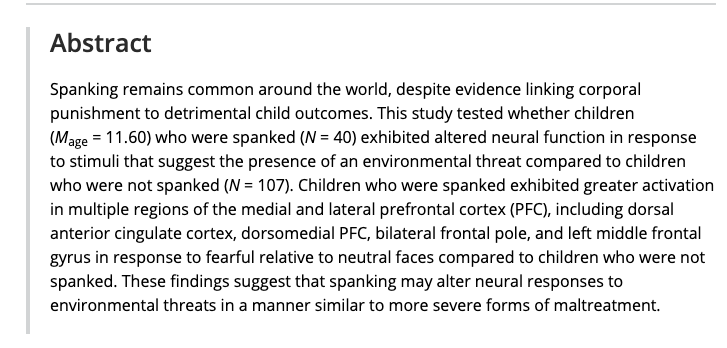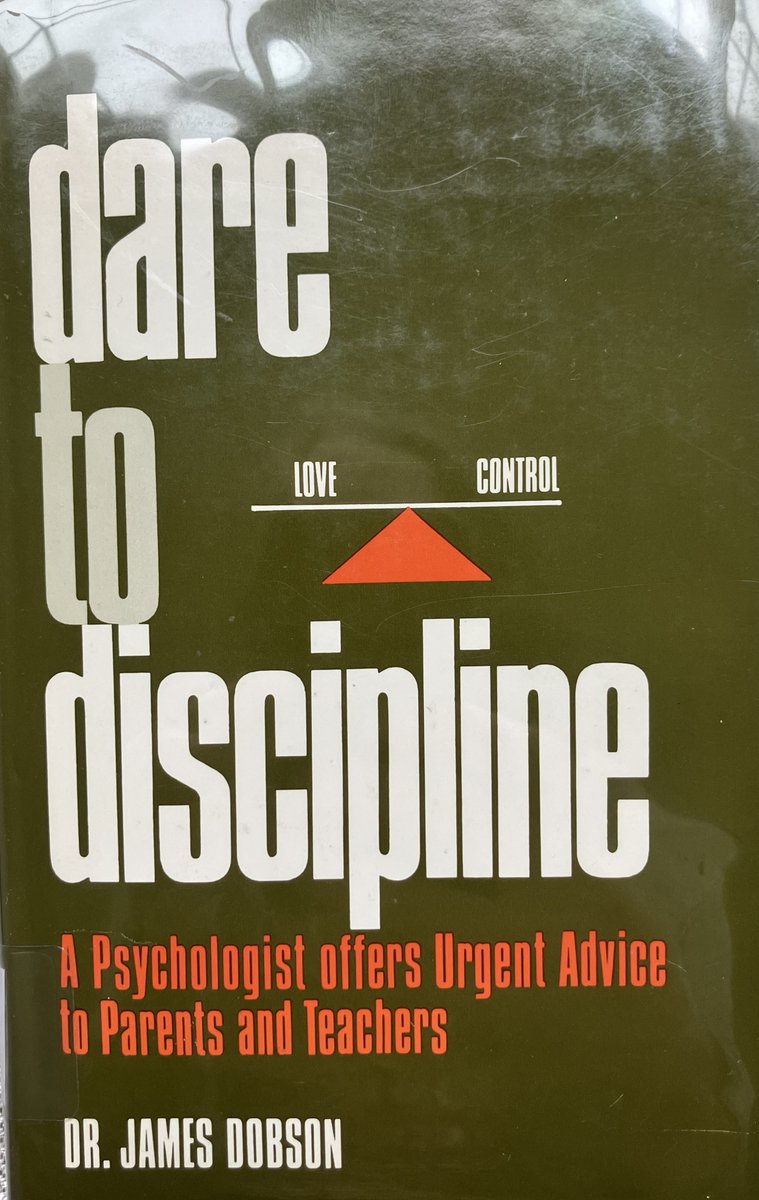It can be difficult to evaluate the impact of corporal punishment (exploration of this & linked studies in this 🧵).
That does not mean we cannot make robust conclusions about the harm.
IMO @janetheimlich's thorough work is essential reading: 🧵 a.co/d/1kxVK4l

That does not mean we cannot make robust conclusions about the harm.
IMO @janetheimlich's thorough work is essential reading: 🧵 a.co/d/1kxVK4l

Any research attempting to evaluate CP (either as "working" or "turned out fine" or "harming" or "trauma") must consider the limitations of self-disclosure, the only data source for things happening behind closed doors.
Loyalty, shame, & memory recall all are relevant. 2/?
Loyalty, shame, & memory recall all are relevant. 2/?
The vulnerability of remembering one's childhood, attachment to primary caregivers, cultural values about honoring parents, all result in understandable loyalties:
I was spanked. I turned out fine. They did their best. I love my parents. 3/?
I was spanked. I turned out fine. They did their best. I love my parents. 3/?
Sometimes self-disclosure is inhibited by shame, both for adult children who find it difficult to name what they endured & for parents who may carry deep regrets.
The ritualization of Mother's/Father's Day in spite of domestic violence stats reveals our cognitive dissonance. 4/?
The ritualization of Mother's/Father's Day in spite of domestic violence stats reveals our cognitive dissonance. 4/?
We also must consider memory recall which differs even w/in families.
It is not uncommon to find adult children who recount visceral details of repeated spankings while their parents sincerely state: You were hardly ever spanked. 5/?
It is not uncommon to find adult children who recount visceral details of repeated spankings while their parents sincerely state: You were hardly ever spanked. 5/?
Some of this testifies to generational patterns, but I also wonder about impact *on parents* who repeatedly ignore a child's cries as they hurt them.
I know of no studies examining what happens to a parent's brain, trauma response, etc. when they repeatedly hit a child. 6/?
I know of no studies examining what happens to a parent's brain, trauma response, etc. when they repeatedly hit a child. 6/?
As with other cases of abuse, sometimes people don't find the words to name their experience until much later in life if at all.
And how does one quantify the individual impact of an act of abuse? 7/?
And how does one quantify the individual impact of an act of abuse? 7/?
https://x.com/MBurtwrites/status/1730019773587874182?s=20
How does a researcher define terms, limit the scope, communicate that to the respondent, and evaluate impact?
How do they account for cultural norms, individual personalities, and ingredients that may have mitigated or escalated harm? 8/?
How do they account for cultural norms, individual personalities, and ingredients that may have mitigated or escalated harm? 8/?
Environmental considerations like, for instance, the isolation of homeschooling or churches/schools where any adult could spank a child are relevant, too.
Alongside all this, there is a chicken/egg dynamic. 9/?
Alongside all this, there is a chicken/egg dynamic. 9/?
Are there pre-existing harmful elements in the family system that result in a parent relying on CP such that CP is simply one manifestation of other problems? Or is it CP that is bringing the harm?
And how does one "prove" cause/effect, whether that CP "worked" or harmed? 10/?
And how does one "prove" cause/effect, whether that CP "worked" or harmed? 10/?
This is why many researchers aim for a very precise scope. Consider this recent study that examined neural function & suggested that spanking has the same brain impact on children as that of more severe forms of maltreatment. 11/? srcd.onlinelibrary.wiley.com/doi/abs/10.111…


Dr. Elizabeth Gershoff has been studying the effect of corporal punishment for decades. Have a look at her well-earned expert opinion: 12/? npr.org/sections/goats…


I find meta-analyses to be the most helpful since they provide a broader lens. I like to share ⬇️ from Gershoff. Reading it reveals the complicated dynamics of this kind of research & the fact that we still can make conclusions. 13/?ncbi.nlm.nih.gov/pmc/articles/P…
These studies are robust and are a reason many parents have rejected CP in their parenting practices.
Christians, however, often double down b/c of suspicions of external sources of authority, esp field of psychology, & erroneous beliefs about what "the Bible says." 14/?
Christians, however, often double down b/c of suspicions of external sources of authority, esp field of psychology, & erroneous beliefs about what "the Bible says." 14/?
They erroneously believe this is a please-God-over-man scenario thanks to popular Christian parenting ideas:
1st wave circa Dobson: Ofc spanking
2nd wave via T. Tripp: Spank "on faith"
3rd wave: cowardly middle-of-the-road silent personal-decision stance. 15/?
1st wave circa Dobson: Ofc spanking
2nd wave via T. Tripp: Spank "on faith"
3rd wave: cowardly middle-of-the-road silent personal-decision stance. 15/?
Ofc there are also a whole slew of Christian influencers, many of them young parents, positioning themselves as Christian parenting advice-givers who ardently defend CP via "trad" or "based" parenting content
The cycles repeat & none of it is theoretical 16/?
The cycles repeat & none of it is theoretical 16/?
CP is harmful, but I contend CP via devoutly religious ppl is a thousandfold more b/c of:
-the implacable moral certainty of the perpetrator
-the accompanying spiritual teaching.
The former enables escalation & the latter exponential impact. (Again, read Heimlich's book!) 17/?
-the implacable moral certainty of the perpetrator
-the accompanying spiritual teaching.
The former enables escalation & the latter exponential impact. (Again, read Heimlich's book!) 17/?
A child may be able to grow up & leave an abusive parent, but where does one go from a God who requires abuse?
This is why I spend so much time making a hermeneutical/exegetical argument against the corporal punishment of children. 18/?
This is why I spend so much time making a hermeneutical/exegetical argument against the corporal punishment of children. 18/?
I know there are Christian parents for whom CP is their hill to die on, but I do believe there are some who simply haven't been given other tools or do not know there are other options. 19/?
https://x.com/MBurtwrites/status/1762702228476068249?s=20
I suppose it's my hill to die on, too, because Christian parents who employ CP are uniquely ill-equipped to listen to children, whether young or adult.
I appeal to other Christians, esp pastors & teachers, to not shy away from addressing this.
/end
I appeal to other Christians, esp pastors & teachers, to not shy away from addressing this.
/end
@threadreaderapp please unroll
• • •
Missing some Tweet in this thread? You can try to
force a refresh





